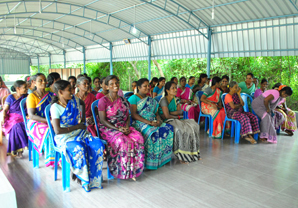Date: September 2016
Location: SATYAM Centre, Poothurai village, Villupuram District, Tamil Nadu
Sustainable rural development is essential to the economic, social and environmental viability of all nations, especially in a developing country like India. Not only is it essential for poverty eradication (since throughout the country poverty is overwhelmingly rural), it would prevent mass migration from rural to urban areas for greater access to education, health, and employment, which further results in extreme poverty, exclusion, vulnerability, marginalization and criminalization.
In the last decade, Sri Aurobindo Rural & Village Action & Movement (SARVAM) in its poverty alleviation and economic development programmes has focused on providing better livelihood opportunities through innovative programmes of wage generation and self-employment. As a result of these programmes, two major results can be evidently seen:
• The employment, basic amenities and infrastructure facilities of the people in the villages under the SARVAM programme have increased drastically.
• Through effective participation of local people and communities in the management of their own economic, social and quality-of-life objectives, the rural populace (particularly women, youth, persons with disabilities and the socially marginalized) has been greatly empowered.
Economic Development Programmes of SARVAM
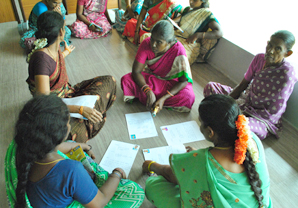 SARVAM started its work in 3 villages, increased its area of operation to 7 villages and recently expanded to include 18 villages. In the new villages and some old, there are pockets of population which still suffer from severe poverty, unemployment and lack of even basic facilities. In order to provide income-generation opportunities to this relegated inhabitants, SARVAM continues to organize income-generation activities. Some of the recent livelihood enhancement and income-generation activities are as follows:
SARVAM started its work in 3 villages, increased its area of operation to 7 villages and recently expanded to include 18 villages. In the new villages and some old, there are pockets of population which still suffer from severe poverty, unemployment and lack of even basic facilities. In order to provide income-generation opportunities to this relegated inhabitants, SARVAM continues to organize income-generation activities. Some of the recent livelihood enhancement and income-generation activities are as follows:
Providing Financial Help to Severely Deprived and Impoverished
Recently, with the help of some philanthropic endeavours of corporates, such as L&T Infrastructure Financ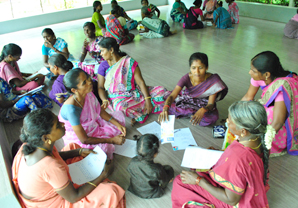 e Company Ltd., soft loans are being given to the people living in abject poverty, with no source or hope for making a living without external support. These very soft, revolving loans help to increase food production in case of failure of crops, drought or flood situations or other adverse circumstances; develop clean water resources; manage health care or deliver emergency medical assistance. This programme also helps to alleviate human suffering and build self-reliant communities and address basic needs as an enabling factor of people’s engagement in productive activities. In a programme conducted on September 12, 2016, more than 40 families were awarded these loans. These people were carefully chosen among many applicants (including the physically disabled, widows and orphans, socially marginalized or aging couples with no support), understanding that their predicament was such that either they do not requisite documentation or know-how to apply for loans from banks or other financial agencies or they do not have the means to repay heavy loan interests or the principal amounts in the near future. This assistance would go a long way to establish their financial viability and economic independence.
e Company Ltd., soft loans are being given to the people living in abject poverty, with no source or hope for making a living without external support. These very soft, revolving loans help to increase food production in case of failure of crops, drought or flood situations or other adverse circumstances; develop clean water resources; manage health care or deliver emergency medical assistance. This programme also helps to alleviate human suffering and build self-reliant communities and address basic needs as an enabling factor of people’s engagement in productive activities. In a programme conducted on September 12, 2016, more than 40 families were awarded these loans. These people were carefully chosen among many applicants (including the physically disabled, widows and orphans, socially marginalized or aging couples with no support), understanding that their predicament was such that either they do not requisite documentation or know-how to apply for loans from banks or other financial agencies or they do not have the means to repay heavy loan interests or the principal amounts in the near future. This assistance would go a long way to establish their financial viability and economic independence.
Building Social Capital through Soft Loans for Rural ‘Start-Ups’
This scheme works to pr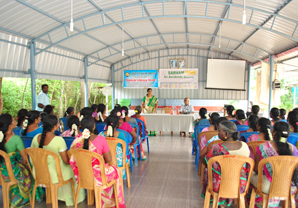 ovide financial assistance to the potential individual/group of entrepreneurs who have the requisite know-how and skill of business but lack necessary monetary resources to meet the requirements for a new enterprise. Keeping up the long and successful association of funding SARVAM self-help groups (SHGs), 300 individuals will be been given loan amounts of Rs 25,000 each, by Indian Bank through their rural training arm Indian Bank Self-Employment Training Institute (INSETI), augmenting provision of and access to financial services as a precursor to improve livelihoods and financial condition of rural populace in SARVAM villages. Most of these groups, formed with 5 members each constituting a joint liability group (JLG), plan to use the accumulated sum of Rs. 125,000 for innovative agricultural practices or implements, cattle rearing or small-scale enterprises. On September 18, 2016, the first batch of 40 women was given these soft loans with long-term interest payback plans. Last year, Indian Bank had provided Rs 15,000 to 250 women, but observing the wholehearted productiveness and successful operations mushrooming all over the villages, it made great business sense to the bank to increase the amount to a larger number of people.
ovide financial assistance to the potential individual/group of entrepreneurs who have the requisite know-how and skill of business but lack necessary monetary resources to meet the requirements for a new enterprise. Keeping up the long and successful association of funding SARVAM self-help groups (SHGs), 300 individuals will be been given loan amounts of Rs 25,000 each, by Indian Bank through their rural training arm Indian Bank Self-Employment Training Institute (INSETI), augmenting provision of and access to financial services as a precursor to improve livelihoods and financial condition of rural populace in SARVAM villages. Most of these groups, formed with 5 members each constituting a joint liability group (JLG), plan to use the accumulated sum of Rs. 125,000 for innovative agricultural practices or implements, cattle rearing or small-scale enterprises. On September 18, 2016, the first batch of 40 women was given these soft loans with long-term interest payback plans. Last year, Indian Bank had provided Rs 15,000 to 250 women, but observing the wholehearted productiveness and successful operations mushrooming all over the villages, it made great business sense to the bank to increase the amount to a larger number of people.
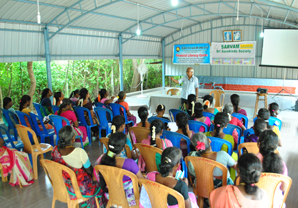 Financial Literacy Programme for Rural Women
Financial Literacy Programme for Rural Women
Financial literacy encourages villagers not only tap the financial systems and schemes available to them, but to discover the opportunities that have not yet been explored. It can protect villagers from aggressive money lenders who may exploit the borrower’s lack of financial knowledge and literacy.
Indian Bank, as partner of growth and change at SARVAM villages, periodically conducts financial literacy programmes at different locations for the rural financial development. On September 17, 2016, one such programme targeting especially women entrepreneurs and even homemakers was organized in which more than 50 women participated. Mr Loganathan of Indian Bank explained common financial instruments, such as bank accounts, loans and interest payments, savings and insurance, in simple and comprehensible terminology. He elucidated how financial knowledge empowers consumers, making them informed about finance in a way that is relevant to their lives and allowing them to use this knowledge to evaluate products and make informed decisions. Those who are financially literate are more likely to save and engage in safe financial products, helping them to become economically strong and self-reliant. He also made the women aware of some of the existing government schemes and programmes which can benefit them immensely.
Motivational Programme for Rural Women
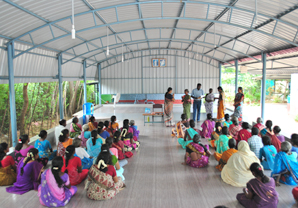 SARVAM team members realized very early during their work in the villages that empowerment of women, especially the economic empowerment of women, is absolutely essential for the progress the area. The results of the research conducted about the economic and social structure in the villages revealed that rural women’s participation in economic activities is much more than what statistics reveal. This is mainly due to the fact that most of the work done by the women at farm and home is disguised as daily chores. They are considered among the ‘non-working’ and ‘dependent’ part of population. Keeping these facts in consideration, SARVAM constantly organizes ‘motivational’ programmes for the women. They are made aware of their roles, responsibilities and even rights to ensure that they life a confident, fruitful life.
SARVAM team members realized very early during their work in the villages that empowerment of women, especially the economic empowerment of women, is absolutely essential for the progress the area. The results of the research conducted about the economic and social structure in the villages revealed that rural women’s participation in economic activities is much more than what statistics reveal. This is mainly due to the fact that most of the work done by the women at farm and home is disguised as daily chores. They are considered among the ‘non-working’ and ‘dependent’ part of population. Keeping these facts in consideration, SARVAM constantly organizes ‘motivational’ programmes for the women. They are made aware of their roles, responsibilities and even rights to ensure that they life a confident, fruitful life.
On September 12, 2016, one such motivational programme was organized by SARVAM, where trainers from District Rural Development Agency (DRDA), Cuddalore, addressed the women on various topics such as income-generation, marketing, rural enterprises and even public-speaking. As all earlier programmes, this programme also led to a very positive response from the participating women.

